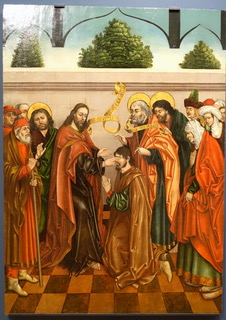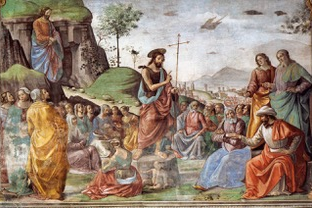Sunday Reflection with Canon Robin Gibbons: 27 October 2024

The Healing of Blind Bartimaeus by Fernando Gallego workshop Univ. of Arizona Museum of Art
Thirtieth Sunday in Ordinary Time
I am not sure why my eyes kept returning to this phrase of Jeremiah from our first reading this Sunday, but it certainly moved me to deeper reflection about trust and hope in the kindness of the Lord:
'With weeping they shall come,
but with compassion I will guide them;
I will lead them to streams of water,
on a level road, without stumbling.
For I am a father to Israel,
Ephraim is my firstborn.'(Jer 17:9)
So if you will indulge my thoughts, I shall try and weave this compassionate image of the Holy One (but not as Donald Trump weaves) into a basis for our shared reflection on our scripture readings this Sunday.
The image we have in this quotation is about a people returning from situations of difficulty, to something that is much better. The 'hint' is there in that statement about God's parenthood of Israel, and indication of Ephraim's firstborn status, but this is not of a single person, but to a known people. As Christians we understand a difference here, for us the only person who can claim an immediate, direct and intimate relationship with the Triune God is Jesus the Christ, and yet through his Incarnation we are allowed to have a direct relationship with him, which then means we too can access the enveloping eternal love that the Holy One has for us humans and for ALL of creation.
We can also accept that in our long salvation history, a particular nation acted as the focus for God's mercy for us all throughout all ages. We can put it this way: the Eternal One does not have favourites, that is clear, so Israel is the image of this eternal Holy One's love and support for all of humanity and yes, all creation in every age. It behoves us as Catholics (a word which means 'universal' as well as 'all embracing') to move out of our religious comfort zones and accept our parentage through the OT and Jesus, of that focused intensity of love found in the Holy One's relationship with the Jewish People, for that is ours too!
How then do we dot the I's, cross the `T's on our scripture messages of this Sunday? It isn't easy but it can be done. We start with this image of a loving, guiding, wandering God, finally taking us home and also showing us the way forward to where we want to go!
The second reading indicates the intimate connection Jesus has with the OT High Priesthood, but points out to us how he then liberates that office, to fix it in his person that is Jesus who is the Christ, and indicates by his own example that it is through his faithful service, and unique offering, that we are able to be saved from sin and death. There is no more weeping, nor mournful sorrow with Christ, but instead it is that our tears are transformed into joy. We find in the poignant tale of Bartimeaus in our gospel that we discover one way forward to that place we so desire, our true and abiding homeland.
Keep in mind that the sequence of our Sunday gospels has taken us on a journey with Mark to discover what faith in Jesus really means and costs. We have travelled through an acrimonious confrontation between Jesus and the Pharisees on divorce, we maybe struggled with the rich young man in terms of our own commitment to following Jesus, and argued about the privilege and glory we think is attached to following Christ, but it is in the story of Bartimeaus, the blind beggar, that the value of our own vision is tested, and the blindness of our lives made apparent. It's a simple story but demands our focussed attention. Baritmeaus is blind but his faith is acute, and his understanding of Jesus is of somebody special! He hears Jesus and unlike the crowd, who seem to have little expectation at this point, he cries out for Jesus as 'son of David' to help him, and when rebuked by an undiscerning crowd, he shouts out all the more. The dialogue is fascinating:
'But he kept calling out all the more, "Son of David, have pity on me."Jesus stopped and said, "Call him." So they called the blind man, saying to him, "Take courage; get up, he is calling you."He threw aside his cloak, sprang up, and came to Jesus.Jesus said to him in reply, "What do you want me to do for you?" The blind man replied to him, "Master, I want to see."Jesus told him, "Go your way; your faith has saved you." Immediately he received his sight and followed him on the way'.(Mk 10:48-52)
What do discern? Firstly there is tenacity in Bartimeaus' faith, a deep inner knowledge and conviction that in Jesus he would find true healing, a real purpose and direction in his life. Secondly there is that total trust that this person of Jesus has the power to give him his sight back, we discern his faith in Jesus is absolute, based on an deeper connection with him, far more insightful than what others see and meet in Jesus but cannot grasp. Thirdly there is an immediate response of Bartimeaus to Jesus call to him. In a gesture reminiscent of St Francis and others he casts aside his support, his comfort, his cloak, which for him is his world, the space on which he sits to beg, and in a kind of nakedness approaches Jesus, and in going to him, calls Jesus by the term 'master' a shift in emphasis that means much. It indicates he is prepared to throw in his lot with Jesus and as the gospel puts it:' Jesus told him, "Go your way; your faith has saved you." Immediately he received his sight and followed him on the way".(Mk 10:52)
Can we hold on to that new sense of purpose shown us by Bartimeaus? Are we able to discern the Christ who calls, heals, loves us in the moments of our own lives? I hope so!
Lectio
Hebrews 5: 1-6
Brothers and sisters:
Every high priest is taken from among men
and made their representative before God,
to offer gifts and sacrifices for sins.
He is able to deal patiently with the ignorant and erring,
for he himself is beset by weakness
and so, for this reason, must make sin offerings for himself
as well as for the people.
No one takes this honour upon himself
but only when called by God,
just as Aaron was.
In the same way,
it was not Christ who glorified himself in becoming high priest,
but rather the one who said to him:
You are my son:
this day I have begotten you;
just as he says in another place:
You are a priest forever
according to the order of Melchizedek.
Poem: Bartimeaus
by John Newton
Mercy, O thou Son of David!
Thus blind Bartimaeus prayed;
Others by thy word are saved,
Now to me afford thine aid:
Many for his crying chid him,
But he called the louder still;
Till the gracious Saviour bid him
Come, and ask me what you will.
Money was not what he wanted,
Though by begging used to live;
But he asked, and Jesus granted
Alms, which none but he could give:
Lord remove this grievous blindness,
Let my eyes behold the day;
Strait he saw, and won by kindness,
Followed Jesus in the way.
O! methinks I hear him praising,
Publishing to all around;
Friends, is not my case amazing?
What a Saviour I have found:
O! that all the blind but knew him,
And would be advised by me!
Surely, would they hasten to him,
He would cause them all to see.


















